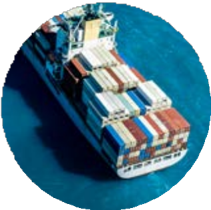 Steamship Mutual P&I Club has published guidance highlighting critical aspects and considerations for preventing losses associated with reefer cargo. Reefer cargo carriage otherwise known as refrigerated cargo in containers involves transporting perishable or temperature sensitive goods that require controlled temperature, humidity, and airflow to maintain quality during transit. Proper handling, monitoring, and documentation are essential to prevent losses and ensure cargo integrity, the guidance advises. Continue reading “Safe Carriage of Refrigerated Cargo in Containers”
Steamship Mutual P&I Club has published guidance highlighting critical aspects and considerations for preventing losses associated with reefer cargo. Reefer cargo carriage otherwise known as refrigerated cargo in containers involves transporting perishable or temperature sensitive goods that require controlled temperature, humidity, and airflow to maintain quality during transit. Proper handling, monitoring, and documentation are essential to prevent losses and ensure cargo integrity, the guidance advises. Continue reading “Safe Carriage of Refrigerated Cargo in Containers”
Shipping
Research finds maritime professionals rejecting full AI adoption

A recent study by Thetius in partnership with Marcura, has revealed maritime companies are stuck in the early stages of AI adoption, unable to scale beyond small experiments as widespread optimism collides with implementation reality.
The study “Beyond the Hype: What the maritime industry really thinks about AI” combined over 130 survey responses and in-depth interviews with maritime professionals, revealing a sector that is both eager and cautious: 82% are optimistic about AI and 81% are running pilot projects. However, 37% have personally witnessed AI failures and only 11% have formal policies to guide scaling. Continue reading “Research finds maritime professionals rejecting full AI adoption”
Updated IAMSAR manual to be carried onboard from January 2026
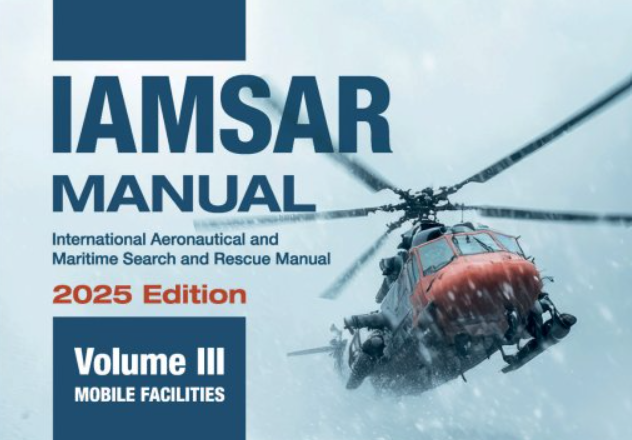
Lloyd’s Register (LR) has advised about upcoming amendments to the IAMSAR (International Aeronautical and Maritime Search and Rescue) Manual, which operators must have onboard their vessels in hard copy by 1 January 2026 to comply with SOLAS regulations.
According to LR, under SOLAS regulation V/21, all ships are required to carry an up-to-date copy of the IAMSAR Manual Volume III. As stated in MSC-MEPC.2/Circ.2, the IAMSAR Manual Volume III must always be available in hard Continue reading “Updated IAMSAR manual to be carried onboard from January 2026”
Key tips for transferring plastic pellets in containers

Steamship Mutual P&I Club has provided guidance on the risks associated with the carriage of plastic pellets in containers and provides practical measures to prevent spillage and protect the marine environment.
Understanding the risks of plastic pellets
According to the Club, in recent years, several high-profile incidents have occurred, such as the Trans Carrier in 2020 and the XPress Pearl in 2021, where containers have fallen overboard and resulted in the release of plastic pellets into seas and oceans with subsequent harm to the marine environment. Continue reading “Key tips for transferring plastic pellets in containers”
Rotten wood and poor inspection caused historic Maine schooner demasting
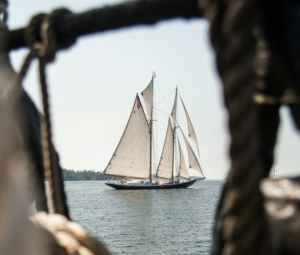
The is a distressing case about a fatal accident that should never have happened. And as the investigation has revealed, a series of poor, inadequate and ineffective inspections and surveys that failed to discover serious rotten wood, would appear to be largely to blame and caused historic Maine schooner demasting.
The U.S. Coast Guard (USCG) has released a critical report on the demasting of a historic schooner, blaming the catastrophic incident on rotten wood that had gone unnoticed for years due to poor inspections. About three years after the mainmast of the 144-year- old schooner Grace Bailey broke during a routine voyage, causing the death of one passenger and leaving five others injured, a detailed investigation has established that the structural integrity of the mainmast had long been compromised by rot. Continue reading “Rotten wood and poor inspection caused historic Maine schooner demasting”
DNV and WMMF collaborate on net-zero guide for shipping companies
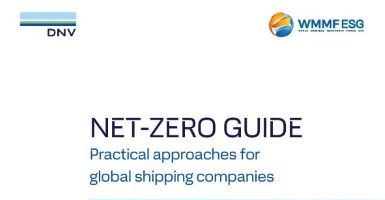 DNV and the World Maritime Merchants Forum (WMMF) have worked together to create the Net-Zero Guide: Practical approaches for shipping companies.
DNV and the World Maritime Merchants Forum (WMMF) have worked together to create the Net-Zero Guide: Practical approaches for shipping companies.
The maritime industry is entering a decisive decade of transformation, driven by evolving regulations, commercial pressures, and a general global shift towards reduced greenhouse gas (GHG) emissions. Continue reading “DNV and WMMF collaborate on net-zero guide for shipping companies”
Dewatering system valves found in closed position
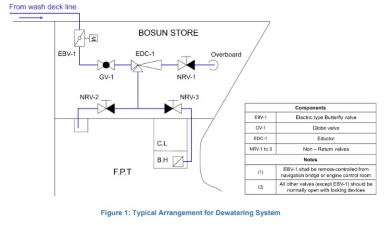
This notice, issued by ABS, summarizes recent observations on bulk carriers where non-compliance with the requirements of SOLAS Chapter XII, Regulation 13.1 was identified in the forecastle space dewatering system manually operated suction valves.
On bulk carriers and in accordance with SOLAS Regulation XII/13.1, MSC/Circ.1069 and IACS UI SC179, the arrangements for draining and pumping ballast tanks located forward of the collision bulkhead and the bilges of any dry space Continue reading “Dewatering system valves found in closed position”
AI is empowering shipowners to tackle new safety management challenges
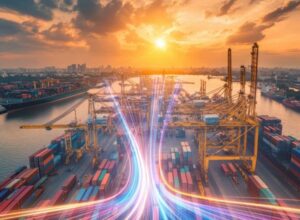
It is no secret that the maritime industry is undergoing a digital transformation, and one of the key innovations increasingly making waves is the integration of artificial intelligence (AI) into safety management systems as AI is empowering shipowners.
The increased documentation required following the gamut of new rules and procedures place increasing demands on seafarers but companies such as WiseStella are leveraging AI to ease the cognitive burden to enhance safety across the global fleet. “Seafarers today are faced with an overwhelming amount of information and documentation to manage,” explains Ali Demiral, Chief Technology Officer, and AI lead at WiseStella. “This cognitive load can be a significant source of stress, especially when it comes to tackling complex safety assessments. But AI-powered technology can provide seafarers and ship managers with the tools they need to navigate these new requirements with confidence.” Continue reading “AI is empowering shipowners to tackle new safety management challenges”
BSafe case study: Benzene vapour death following unauthorised tank entry
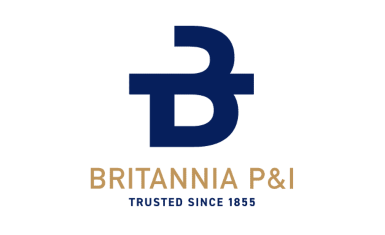
Britannia P&I Club have cautioned its members on the dangers of entering an enclosed space after a benzene vapour death in the cargo hold of a tanker.
Background
An 8,270 gt oil/chemical tanker had discharged benzene on its previous voyage and was proceeding in ballast towards Korea to load its next nominated cargo. The ship had completed discharge at Jiangyin, China and departed for Yeosu, Korea. The planned sequence between voyages included a full cycle of gas freeing and cleaning of cargo tanks in preparation for the next chemical cargo. Continue reading “BSafe case study: Benzene vapour death following unauthorised tank entry”
Ship to Ship Transfer Guide for Petroleum, Chemicals and Liquefied Gases update published
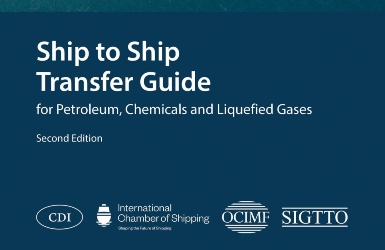 The Chemical Distribution Institute (CDI), International Chamber of Shipping (ICS), Oil Companies International Marine Forum (OCIMF) and the Society of International Gas Tanker and Terminal Operators (SIGTTO) have released the second edition of ‘Ship to Ship Transfer Guide for Petroleum, Chemicals and Liquefied Gases’.
The Chemical Distribution Institute (CDI), International Chamber of Shipping (ICS), Oil Companies International Marine Forum (OCIMF) and the Society of International Gas Tanker and Terminal Operators (SIGTTO) have released the second edition of ‘Ship to Ship Transfer Guide for Petroleum, Chemicals and Liquefied Gases’.
Originally published by OCIMF in 1975, the STS Transfer Guide was consolidated in 2013 through the combined expertise of CDI, ICS, OCIMF and SIGTTO. Recognised globally by the tanker industry and IMO Member States as the definitive reference for safe and effective STS operations, this new second joint edition, released in the 50th anniversary, reflects current best practices, regulatory developments and technical innovations. Continue reading “Ship to Ship Transfer Guide for Petroleum, Chemicals and Liquefied Gases update published”
AMSA issues safety bulletin highlighting improperly secured cargo
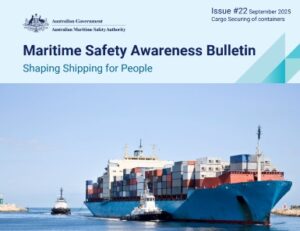
The Australian Maritime Safety Authority (AMSA) issues a safety bulletin highlighting that improperly secured cargo continues to contribute to container losses, prompting renewed focus on inspections, crew training and weather preparedness. According to the World Shipping Council (WSC), the number of containers lost at sea has fluctuated over the 17 years of recorded data. The overall trend is encouraging. Despite occasional spikes, long-term data shows a clear decline in container losses compared to earlier years. At the same time, awareness and caution surrounding cargo loss have increased. Continue reading “AMSA issues safety bulletin highlighting improperly secured cargo”
UNCTAD Review of Maritime Transport 2025 report
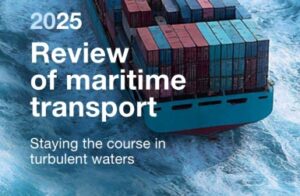
The United Nations Conference on Trade and Development (UNCTAD) has published its Review of Maritime Transport 2025 report, exploring the global maritime trade environment which has been marked particularly by volatility, rerouted flows and uncertainty.
According to the Review of Maritime Transport 2025 report, maritime trade volumes reached 12,720 million tons in 2024, growing by 2.2 per cent, exceeding the 2013–2023 average (1.8 per cent). This suggests positive momentum, yet the growth rate lagged the 2003–2023 average Continue reading “UNCTAD Review of Maritime Transport 2025 report”